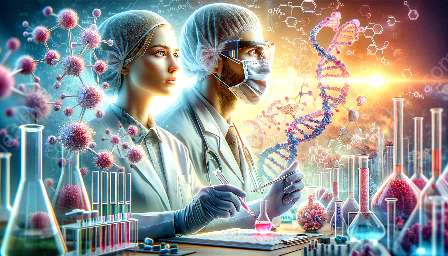Drug delivery systems play a crucial role in the field of medicinal chemistry and pharmacy, as they provide innovative methods for administering therapeutic agents to targeted sites within the body. These systems encompass a wide range of technologies and mechanisms that aim to improve the efficacy and safety of drug delivery. In this comprehensive guide, we will explore the fascinating topic of drug delivery systems, delving into their applications, advancements, and impact on medicinal chemistry and pharmacy.
Understanding Drug Delivery Systems
Drug delivery systems refer to the methods and technologies used to transport therapeutic agents to specific sites within the body. The main goal of these systems is to enhance the bioavailability and targeting of drugs while minimizing adverse effects and improving patient compliance. By harnessing the principles of chemistry, biology, and pharmacology, scientists have developed a diverse array of drug delivery systems that cater to varying therapeutic needs and delivery challenges.
Types of Drug Delivery Systems
There are several types of drug delivery systems, each designed to address specific requirements related to drug solubility, stability, and targeted delivery. Some of the prominent types include:
- Oral Drug Delivery Systems: These systems are designed to administer drugs through the oral route, utilizing technologies such as multiparticulate drug delivery systems, oral films, and gastroretentive drug delivery systems to optimize drug absorption and release. They are particularly crucial in pharmacy, as they offer convenient and patient-friendly options for drug administration.
- Transdermal Drug Delivery Systems: These systems involve the delivery of drugs through the skin, providing a non-invasive and steady release of therapeutic agents into the systemic circulation. Transdermal patches and microneedle-based delivery systems are examples of advanced transdermal delivery technologies that have revolutionized the field of medicinal chemistry.
- Injectable Drug Delivery Systems: Injectable systems encompass a broad spectrum of delivery methods, including intravenous, intramuscular, and subcutaneous injections. These systems are crucial for delivering potent and rapid-acting drugs, and they rely on advanced formulations and materials to ensure precise administration and absorption of therapeutic agents.
- Nanoparticle-Based Drug Delivery Systems: Nanoparticle formulations are engineered to encapsulate drugs and enable targeted delivery to specific tissues or cells within the body. These systems leverage the unique properties of nanoparticles to enhance drug stability, solubility, and biodistribution, making them valuable tools for medicinal chemistry research.
Advancements in Drug Delivery Systems
The field of drug delivery systems continues to evolve rapidly, driven by ongoing research and technological innovation. Scientists and pharmaceutical researchers are continually exploring new avenues to improve drug delivery, resulting in remarkable advancements such as:
- Smart Drug Delivery Systems: These systems incorporate responsive elements to enable precise control over drug release, triggered by specific stimuli such as pH, temperature, or enzymatic activity. By harnessing these stimuli-responsive mechanisms, smart drug delivery systems offer enhanced targeting and reduced systemic exposure, thus minimizing potential side effects.
- Nanotechnology-Based Delivery Systems: Nanotechnology has revolutionized drug delivery by enabling the design and fabrication of nanoscale carriers for drug transport. Nanoparticles, liposomes, and dendrimers are extensively studied for their ability to encapsulate and deliver drugs, offering advantages such as improved bioavailability, sustained release, and targeted delivery to disease sites.
- Biodegradable Drug Delivery Systems: These systems are designed to gradually degrade or be metabolized within the body, ensuring controlled release of drugs over time. Biodegradable polymers and implants are utilized to develop long-acting drug delivery systems that eliminate the need for frequent dosing and enhance patient compliance.
- Enhanced Drug Formulation: Drug delivery systems allow for the optimization of drug formulations, enabling the development of novel dosage forms with improved stability, solubility, and bioavailability. Through pharmaceutical research, these advancements contribute to the creation of more effective and patient-friendly drug products.
- Precise Targeted Delivery: Advanced drug delivery systems facilitate the precise targeting of drugs to specific tissues, organs, and cells, thereby enhancing therapeutic efficacy while minimizing off-target effects. This targeted approach is particularly valuable in the treatment of complex diseases and cancer, where localized drug delivery can improve patient outcomes and reduce systemic toxicity.
- Personalized Medicine: The convergence of drug delivery systems with medicinal chemistry has paved the way for personalized medicine, where tailored drug delivery strategies cater to individual patient needs and characteristics. By customizing drug formulations and delivery mechanisms, pharmacists can optimize treatment outcomes and patient adherence.
Applications of Drug Delivery Systems in Medicinal Chemistry and Pharmacy
The impact of drug delivery systems on medicinal chemistry and pharmacy is profound, as these systems influence the design, development, and administration of pharmaceutical agents. Through the integration of drug delivery technologies, medicinal chemists and pharmacists can achieve the following:
Conclusion
Drug delivery systems represent a dynamic and multifaceted field that intersects with medicinal chemistry and pharmacy, offering innovative solutions for optimizing drug administration and therapeutic outcomes. The continuous advancements in drug delivery technologies hold immense promise for the future of pharmaceutical research and patient care, as they facilitate the development of more efficacious, targeted, and patient-friendly drug products. By delving into the realm of drug delivery systems, we gain valuable insights into the intricate mechanisms and applications that shape the landscape of modern pharmaceutical science.


